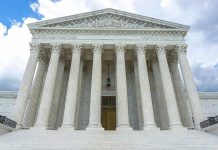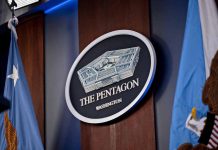
Hassan Nasrallah’s death leaves Hezbollah in disarray, threatening a new era of chaos in the Middle East.
At a Glance
- Hezbollah leader Hassan Nasrallah killed in Israeli airstrike in Beirut
- Iran declares five days of mourning, warns Israel against further attacks
- Hezbollah vows to continue fight against Israel despite leadership loss
- Concerns rise over potential increase in international terrorism
- Canadian police on high alert for potential threats to Jewish community
Nasrallah’s Death: A Turning Point in Middle East Conflict
In a seismic shift that’s sent shockwaves through the Middle East, Hezbollah leader Hassan Nasrallah was killed in an Israeli airstrike in Beirut. This bold move by Israel marks a significant escalation in the ongoing conflict, potentially reshaping the geopolitical landscape of the region. The death of Nasrallah, long considered the mastermind behind Hezbollah’s rise to power, leaves a leadership vacuum that could have far-reaching consequences for Lebanon, Iran, and the broader Middle East.
The elimination of Nasrallah is a clear victory for Israel and a devastating blow to Hezbollah’s operational capabilities. Israeli Prime Minister Benjamin Netanyahu’s statement, “He wasn’t another terrorist. He was the terrorist,” underscores the significance of this operation. This strategic strike not only decapitates Hezbollah’s leadership but also sends a strong message to Iran and other terrorist organizations that threaten Israel’s security.
Statement from @POTUS Joe Biden on the Death of Hassan Nasrallah
“𝗛𝗮𝘀𝘀𝗮𝗻 𝗡𝗮𝘀𝗿𝗮𝗹𝗹𝗮𝗵 𝗮𝗻𝗱 𝘁𝗵𝗲 𝘁𝗲𝗿𝗿𝗼𝗿𝗶𝘀𝘁 𝗴𝗿𝗼𝘂𝗽 𝗵𝗲 𝗹𝗲𝗱, 𝗛𝗲𝘇𝗯𝗼𝗹𝗹𝗮𝗵, 𝘄𝗲𝗿𝗲 𝗿𝗲𝘀𝗽𝗼𝗻𝘀𝗶𝗯𝗹𝗲 𝗳𝗼𝗿 𝗸𝗶𝗹𝗹𝗶𝗻𝗴 𝗵𝘂𝗻𝗱𝗿𝗲𝗱𝘀 𝗼𝗳 𝗔𝗺𝗲𝗿𝗶𝗰𝗮𝗻𝘀 𝗼𝘃𝗲𝗿… pic.twitter.com/ICVkbJScWg
— U.S. Central Command (@CENTCOM) September 28, 2024
Hezbollah’s Struggle and Iran’s Dilemma
In the wake of Nasrallah’s death, Hezbollah finds itself in a precarious position. The group’s acting leader, Naim Kassem, has vowed to continue the fight against Israel, but the loss of such a charismatic and influential figure as Nasrallah is bound to have a significant impact on morale and strategic decision-making. Iran, Hezbollah’s primary backer, now faces a difficult choice: either condemn Israel and risk further escalation or advise Hezbollah to accept a ceasefire, potentially losing credibility among its supporters.
This rhetoric from Iran’s supreme leader, while fiery, belies the complex calculations Tehran must now make. The loss of Nasrallah complicates Iran’s strategic position in the region and may force a reassessment of its approach to the conflict with Israel. The coming days will be crucial in determining whether Iran chooses to escalate the situation or seek a diplomatic resolution to prevent further losses.
Global Implications and Security Concerns
The ripple effects of Nasrallah’s death extend far beyond the Middle East. Security experts warn of the potential for increased international terrorism as Hezbollah may seek to retaliate on a global scale. This threat is particularly concerning for countries like Canada, which has served as a facilitation and fundraising hub for Hezbollah in the past.
Canadian law enforcement agencies are on high alert, particularly concerning potential threats to the Jewish community. The Toronto Police Service has increased its presence in certain areas, demonstrating the global reach of this Middle Eastern conflict. This situation underscores the need for heightened vigilance and international cooperation in combating terrorist networks that exploit Western nations for support and resources.
A Decisive Moment for Israel and the Region
Israel’s successful operation against Nasrallah represents a significant tactical advantage in its ongoing struggle against Hezbollah and other Iran-backed militant groups. The Israeli military has mobilized additional battalions, signaling its readiness for a potential ground invasion if necessary. This assertive stance by Israel, coupled with the elimination of Hezbollah’s top leadership, may create an opportunity for a decisive shift in the balance of power in the region.
As the dust settles on this momentous event, the international community watches closely. The U.S. and its allies have called for a cease-fire, but Israel shows little interest in halting its military operations. With Hezbollah weakened and potentially fractured, Israel may see this as a crucial moment to press its advantage and secure its northern border.
In conclusion, the death of Hassan Nasrallah marks a critical juncture in the Middle East conflict. While Hezbollah vows to fight on, the loss of its charismatic leader and strategic mastermind may prove insurmountable. As Israel continues its offensive, the coming weeks will determine whether this event leads to a broader regional conflict or paves the way for a new, more stable balance of power in the Middle East. One thing is certain: the landscape of regional politics and security has been irrevocably altered, and the repercussions of Nasrallah’s death will be felt for years to come.

















